Physical Address
304 North Cardinal St.
Dorchester Center, MA 02124
Physical Address
304 North Cardinal St.
Dorchester Center, MA 02124

Pack your smartphone and discover hidden treasures in your neighborhood through geocaching, an outdoor adventure game perfect for family bonding.
You’ve probably walked past dozens of hidden treasures in your neighborhood without realizing it. Right now, millions of small containers are tucked away in parks, urban areas, and hiking trails worldwide, waiting to be discovered by families like yours. Geocaching transforms ordinary locations into exciting adventure spots, and you don’t need expensive equipment to join in. With just your smartphone and a free app, you can start hunting for these cleverly concealed caches while creating lasting memories with your children.
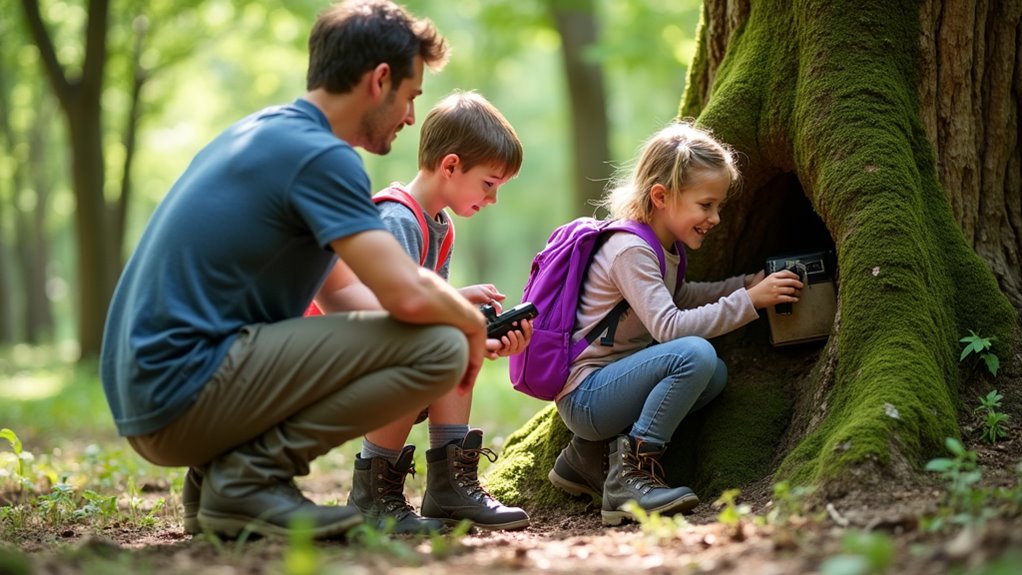
While many family activities can be expensive or lose their appeal quickly, geocaching distinguishes itself as an ideal family pursuit that combines adventure, learning, and togetherness without breaking the bank.
You’ll find that geocaching naturally promotes teamwork and collaboration as your family works together to solve puzzles and locate hidden treasures. The activity requires families to use GPS devices or smartphones to find hidden containers in various locations.
This outdoor treasure hunting game strengthens family bonds through shared experiences and active participation. Your children will develop important skills like navigation and problem-solving while exploring the natural world around them. The surprising benefits of camping for mental well-being can also be experienced through the outdoor nature of geocaching.
It’s an activity that suits all ages and fitness levels, making it truly inclusive for every family member.
Best of all, geocaching encourages regular outdoor adventures that foster environmental awareness and create lasting memories, all while keeping your family physically active and mentally engaged.
Before commencing your geocaching adventure, you’ll need to gather some essential tools that balance functionality with cost-effectiveness. Most beginners can start with just a smartphone and a few basic items, keeping the initial investment minimal while ensuring a safe and enjoyable experience.
Your basic geocaching toolkit should include:
A simple geocaching toolkit lets you start exploring right away – just grab your phone, a pen, and basic safety supplies.
As you gain experience, you can gradually add more specialized tools, but these basics will get you started without breaking the bank. Remember to keep extra batteries or charger handy to ensure your device remains powered throughout your adventure. The best camping tips for first-timers can also be useful for your geocaching expeditions.
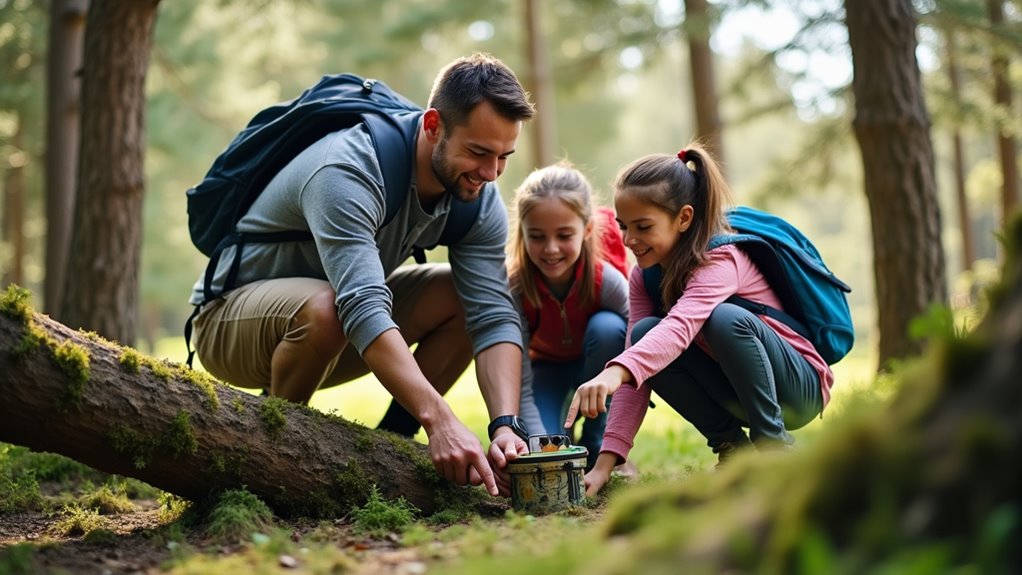
Once you’ve gathered your basic tools, finding your first geocache can be an exciting adventure that won’t cost you anything but time and enthusiasm.
Start by opening your geocaching app and selecting a nearby cache with low difficulty and terrain ratings. These beginner-friendly caches are perfect for learning the basics.
When you’re close to the coordinates, slow down and examine your surroundings carefully. Look for anything that seems out of place or unusual. Remember that caches can be cleverly disguised, so check both high and low spots in the area. Watch for containers like ammo cans or tupperware that might be hidden from view.
Use the provided hints if you’re stuck – they’re free and helpful for newcomers. Camping clubs and community can also provide helpful advice and support for new geocachers.
After finding the cache, sign the logbook and return it exactly as you found it.
Don’t forget to log your find in the app to track your progress.
When heading out for a family geocaching adventure, safety should be your top priority. Ascertain all devices are fully charged and pack backup power sources. Choose geocaches with terrain difficulty ratings suitable for your entire family, especially young children, and stick to well-marked trails or public areas. Make sure to select caches with terrain ratings below 2.5 for easier navigation with kids.
Stay vigilant about these essential safety measures:
Pack essential camping gear to ensure your family’s comfort and safety while geocaching.
Remember to follow Leave No Trace principles and maintain proper hygiene when handling caches.
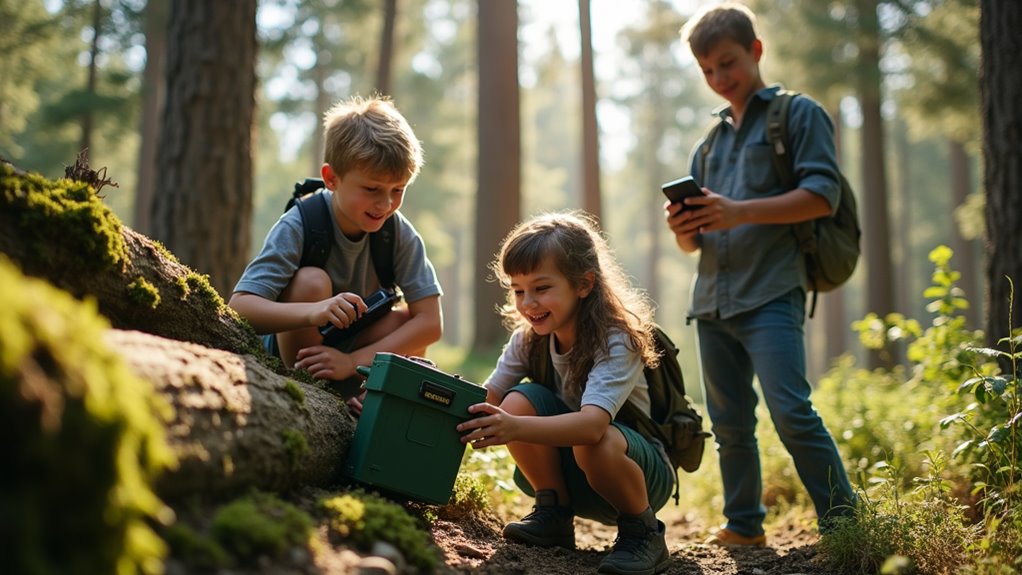
Finding the perfect geocaching spots for kids requires choosing locations that balance adventure with accessibility and safety. Urban parks offer an ideal starting point, with easy trails, nearby amenities, and well-maintained caches often placed near playgrounds and picnic areas.
Nature trails and preserves provide varied difficulty levels while combining geocaching with wildlife watching and outdoor education. You’ll find waterfront locations particularly exciting for children, as they mix treasure hunting with beach play and shoreline exploration. Respect for the natural environment is crucial when exploring these areas.
Your local neighborhood spots and community parks are perfect for quick geocaching trips, featuring kid-friendly caches that you can easily reach on foot or bike. Create amazing learning opportunities by having children solve GPS navigation puzzles as they search.
Don’t miss special geocaching events at parks and preserves, where your family can join themed hunts and meet other geocachers while learning the basics in a supportive environment.
Getting started with geocaching doesn’t require expensive equipment – you can begin your treasure hunting adventures with items you already own. Your smartphone with a free geocaching app is enough to start exploring, while basic supplies like a pen, notebook, and water bottle will keep you prepared on the trail.
For a more dedicated setup that won’t break the bank, consider these budget-friendly essentials:
These affordable options will equip you for successful cache hunting while keeping costs low. It’s recommended to start with simple geocaches to build confidence and experience before attempting more challenging finds. Essential tips for your first camping adventure can also help prepare you for your geocaching journeys.
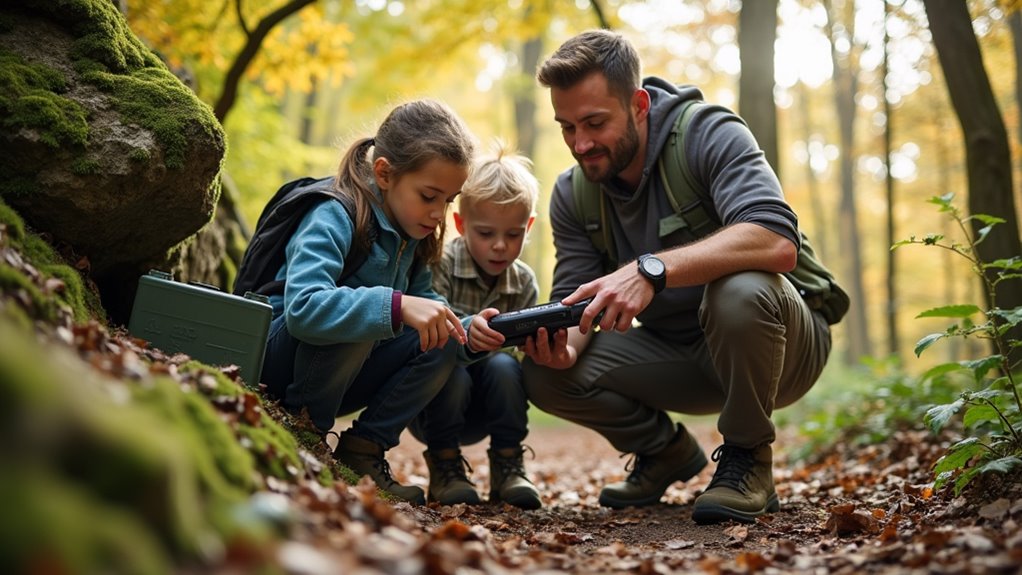
Beyond its recreational value, geocaching serves as a powerful educational tool that develops essential life skills in children and adults alike.
You’ll watch your family members grow in multiple areas as they navigate to cache locations and solve puzzles together.
Your children will enhance their map-reading abilities, critical thinking, and technological literacy while using GPS devices and following multi-step directions.
They’ll develop vital social skills through teamwork and group problem-solving, building confidence with each successful find.
Through geocaching, you’re also teaching environmental responsibility and respect for nature.
Geocaching instills a deep appreciation for our environment, teaching adventurers to tread lightly and protect the natural world around them.
The activity builds resilience and perseverance as your family learns to overcome challenges and adapt strategies.
Whether it’s organizing supplies, planning routes, or making decisions on the trail, geocaching naturally cultivates practical skills that extend far beyond the game itself.
Visiting caches often leads to discovering historically significant sites, providing enriching educational experiences about local heritage and geography. Geocaching can also introduce families to fun outdoor activities to enjoy while camping.
While traditional geocaching offers plenty of fun on its own, you can transform ordinary cache hunts into extraordinary adventures through creative customization. Consider designing themed caches based on your family’s favorite stories or local history, making each search more engaging and memorable without spending extra money.
These creative touches don’t require expensive materials but add significant value to your geocaching experience, keeping family members of all ages engaged and excited about their next adventure.
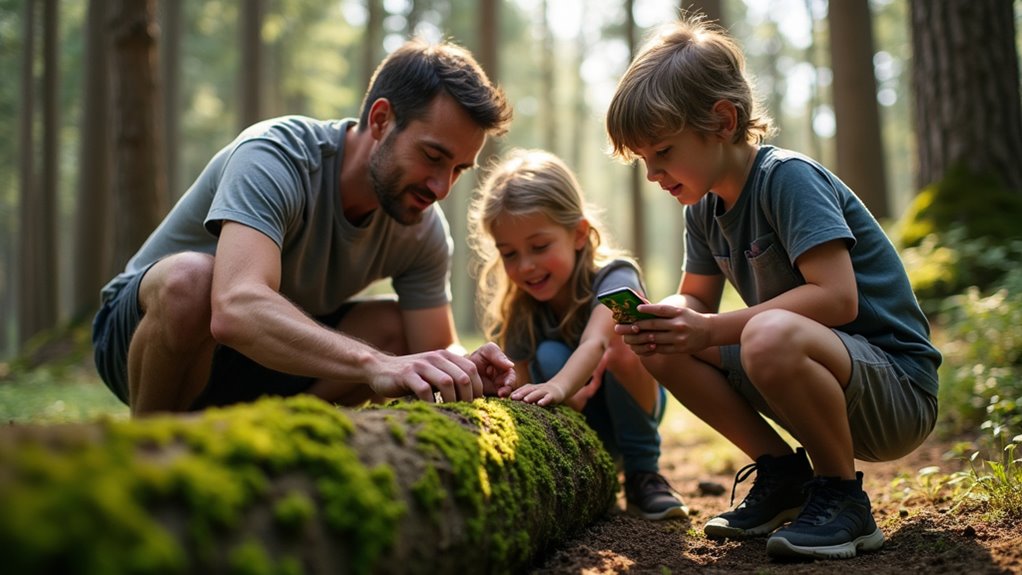
Treasure hunting through geocaching creates powerful family bonds that extend far beyond simply finding hidden caches.
You’ll discover that working together to solve puzzles and navigate to cache locations naturally builds trust and communication between family members.
When you’re out geocaching, you’re not just getting exercise – you’re developing essential life skills together.
Your kids will learn problem-solving abilities while you help them read maps and follow clues. With 38 years old being the average geocacher age, parents are perfectly positioned to guide their children in this activity. It’s a budget-friendly way to spend quality time outdoors, away from screens and daily distractions.
Essential Tips for a Memorable Family Camping Trip can also help enhance your geocaching experience by providing insights into planning and packing for outdoor adventures.
Make it even more engaging by turning your hunts into friendly family competitions or creating themed adventures.
You’ll find that each discovery becomes a shared victory, strengthening your family’s connection while creating lasting memories that don’t strain your wallet.
Joining the global geocaching community opens up a world of connections far beyond your family circle.
With over 59,000 annual events and more than 200 organizations worldwide, you’ll find plenty of opportunities to meet fellow geocachers without spending much money. Staying connected while enjoying the great outdoors can be an integral part of the geocaching experience.
The community’s massive scale, spanning 191 countries with over 3.3 million active caches, means you’re never far from a new adventure or friendly face. Since its inception in 2000 with just 75 known caches, the game has grown exponentially to become a worldwide phenomenon.
You’ll discover that geocaching is like a golden key that reveals countless family adventures right in your backyard. With just your smartphone and a spirit of exploration, you’re ready to set off on budget-friendly quests that’ll create lasting memories. Start your treasure hunting journey today, and you’ll soon find that the real prize isn’t in the cache—it’s in the precious time spent together outdoors.